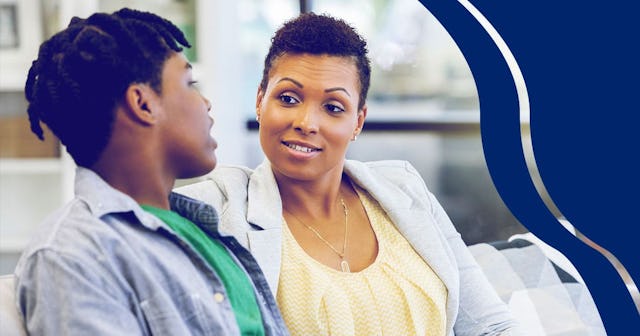The Night I Heard My Teenage Son Defending Himself Against The N-Word

Last night, my son retired to his room to play Fortnite, the popular video game among teens that allows interaction with people from around the world.
He has played with gamers from all over the United States, Latin America, Europe and, last night, Canada.
Whenever I miss my headset, I look in his room because he uses it for the game. I’m not sure if that’s a good thing but, right now, in the middle of the pandemic and the anti-racist uprisings around the world, I’m giving grace and allowing an unmade bed, sleeping late, the declination of Brussels sprouts and playing Fortnite with headphones.
Because of the use of the headphones, I heard his half of an argument, literally him screaming into the phone.
“You can’t say it. It’s wrong. It’s the ugliest slur you can use. Don’t use it. Ever.”
Of course, I check in on him and he waves me out of the room.
“That word has been used to keep Black people down, put us in a corner. It’s ugly, it’s unacceptable. You can’t use it.”
I go back into my room, both angry that this moment is happening and proud that he is using the tools to combat it.
Go ahead son, tell her, I say in my head.
“What the hell do you mean I don’t sound Black? What the…”
He finally comes in my room, steaming mad.
Him: “Mom, I can’t believe this crap. I am playing this 14-year old girl on Fortnite and she just casually says ‘watch me, I’m going to get this ni***r!’.”
Me: “What?!?!
Eva-Katalin/Getty
Him: “Yes, Mom. She is a 14-year old girl and she lives in Vancouver. I am so angry. I can’t believe this.”
Me: “What more did she say, and more importantly what did you say?”
We learned that she felt that she could say it, she was in a safe space (her own home), had heard others say it, and used to have a Black boyfriend. She further attempted to justify her remarks by saying “you don’t even sound Black,” implying that she would not have said it if she knew he was Black.
The worst part of this story is when my son said “things are never going to get better if 14-year old kids are speaking like this.”
My heart sunk.
Dear parents, teachers, educators, and those seeking to be allies in creating an anti-racist world — we must actively listen in on teenage chatter, music and social media, and that of their friends, eavesdropping if necessary.
We must shut it down when it’s racist.
We must give kids, teens and, sadly, some adults, the tools they need to respond, to shut down racism and racial slurs when they see, hear or experience it.
Some of you may be shocked and surprised at how often our kids and teens are casually tossing around the n-word and other racial slurs. Don’t be, because this is not new.
In fact, just a few months ago, I was getting coffee in my lobby and came upon four teenagers, having fun, joking, and hanging out eating pizza. One was black and the other three non-white, from countries around the world. Just as I turned the corner, one of them casually dropped the n-word in the conversation.
I spun on my heels and confronted them. I told them that the n-word is an ugly word — the ugliest word — anchored in the practice of enslaving African people to be of labor and service to this country and perpetuated through the systemic and continued racist treatment of Black people since 1619. I told them it was unacceptable, to never use it, ever. Not in the presence of Black people, not in the company of White people or any other people.
Not in your head. Not alone, not in a group, not on social media.
Not if you think it’s just a word. (It’s not.)
Not if you hear it in a song.
Not if you heard someone say they were reclaiming it and taking back its power.
Never.
Then, I looked directly at the Black teenager and told him not to allow someone to use it or be comfortable using it in his presence. That he is called to do better, boldly advocate for Black people and anti-racism.
Sadly, there are kids, Black kids among them, who hear the slur and say nothing.
Why?
Because kids and teens generally don’t like confrontation, they desperately want to belong, they want to “play” and be included. As a result, they often say or let racist comments go unchecked, dismissing the offense with “I didn’t mean anything by it” or “it was just a joke.” But, the implications of letting it go are far too dangerous.
For Black kids who learn, play and exist in predominantly white spaces they are, more often than you imagine, presented with the slur with the expectation that they too let it go. A friend might also say …“it’s cool, you are my friend… I don’t really think of you as Black.”
Sigh.
What happened to the 14-year old Fortnite princess gamer in Vancouver who used to have a Black boyfriend? My son blocked her on the video game, but not before checking her Instagram. What did we find?
Last Tuesday, she posted a black square with the hashtag #BlackLivesMatter.
—
The author recommends these three resources for all allies advocating and doing the work to create an anti-racist world:
CNN Sesame Street
Toolkit for “Straight Talk About the N-word” | Teaching Tolerance
https://www.tolerance.org/magazine/toolkit-for-straight-talk-about-the-nword
1619 podcast
The 1619 Project – The New York Times
This article was originally published on